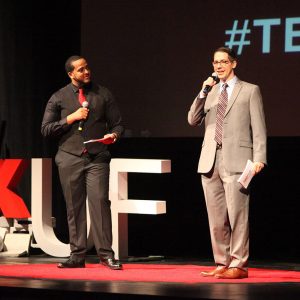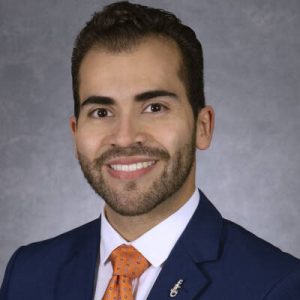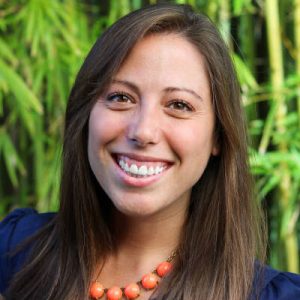EEP opens doors to new opportunities for UF faculty and staff
Journalist Sydney J. Harris said, “the whole purpose of education is to turn mirrors into windows.” While windows open our minds to new perspectives, UF’s Employee Education Program (EEP) creates doorways through which faculty and staff can confidently enter to find themselves somewhere new and better.
Modeled after its predecessor, the state-run Tuition Fee Waiver Program, and administered by UFHR Training & Organizational Development (TOD), the EEP is a source of financial support for faculty and staff looking to gain new skills and further their professional goals.

“One thing the EEP taught me is that you have no idea what opportunities will come your way when you are pursuing something to better yourself – like continuing your education,” said Brandon Telg, TOD instructional designer.
Telg received his master’s degree in leadership development from the College of Agricultural and Life Sciences. The first class he took as part of the EEP was Interpersonal Leadership. His experiences in this class and the knowledge he gained led him to start Self Narrate, a 501(c)3 nonprofit that teaches people how to write their stories and gives them spaces to share those stories.
The EEP covers up to six credit hours per semester for full-time faculty, TEAMS and USPS staff who have completed six months of work at UF. EEP participants can take courses at UF or Santa Fe College as either non-degree or degree-seeking students. Employees outside of Alachua County can use the EEP to attend the public state of Florida institution that is closest to their workplace.
“A perk of the program that I believe makes it beneficial as compared to other tuition programs is that we don’t have caps on the number of credit hours a person can take throughout their career with UF — provided they stay within six credits per semester,” said TOD’s Awards Coordinator Verlissa Ford.
Over the years, this perk has become vital for many UF employees, as they were able to aim for higher educational goals while gaining new professional skills. And while the EEP is not structured to cover entire degree programs, there are many programs at UF that are considered EEP-friendly.
“We have some participants who started out working on an AA degree and over the years, they are now working on doctorate-level courses,” remarked Ford.

For employees like Abel Gilbert, development coordinator in the College of Dentistry, having the financial support to pursue classes while continuing his work at UF was central in helping him complete his degree.
“I wanted to pursue graduate education since before completing my bachelor’s degree at UF in 2013,” said Gilbert. “However, because I worked full time at UF since then, I was reluctant to give up an income to attend school again. So, having the majority of my master’s degree covered through EEP waivers was very important to me. We are fortunate to be given this chance to work and complete education simultaneously at a top public institution — and this program is an opportunity of a lifetime.”
Many UF employees have also used the EEP to advance their careers. In Ford’s view, this is a distinct bonus for departments.
“This program can improve an employee’s performance and growth. Because they have pursued more training and education in a specific area, that person is now able to advance within your department or perform at a higher level. It is a great benefit to have someone on the team that has reached a higher level or capacity to perform,” said Ford.

For Alex Avelino, student affairs program coordinator at the College of Veterinary Medicine, the EEP not only helped her professionally but directly and positively impacted her department. Avelino used the EEP to pursue a master’s in mass communication through the College of Journalism and Communications. As part of her program, and in collaboration with the College of Veterinary Medicine, Avelino created “Underrepresented No More” — a multimedia website featuring pre-vet resources focused on reaching underrepresented minority students.
“Since completing my degree, I approach my position at the College of Veterinary Medicine more strategically,” said Avelino. “I am able to become a resource to others who hope to expand their understanding of communications, specifically at colleges of vet med. I am an adjunct faculty member in the College of Journalism and Communications, which never would have happened without this program.”
In Ford’s view, the benefits of the EEP go beyond professional or academic development.
“When I think of the EEP, I not only think of the program in terms of what it can do professionally,” said Ford. “The EEP allows an individual access and an educational opportunity that may not have been available to them before. For some, because they work for UF, they may become first-generation college students. This has unlimited impacts for the individual, UF and our community. That’s a very powerful story.”